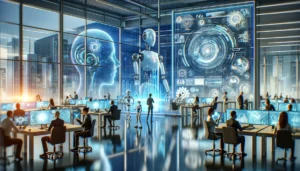As we move deeper into the digital age, Artificial Intelligence (AI) is becoming an inextricable part of our daily lives. From virtual assistants to autonomous systems in manufacturing, AI is profoundly reshaping the fabric of the workplace. This technology is changing the way we interact with the world, influencing everything from personal communication to complex industrial operations.
This advancement brings with it a fascinating duality: the automation of existing jobs and the creation of new career opportunities. In this post, we will explore how AI is transforming work, paving the way for unique innovations and challenges. We will dive into the implications of this transformation and discuss what it means for the future of professions and the evolution of the workplace.
Automation and Efficiency
AI has the power to automate repetitive and time-intensive tasks, freeing up humans to focus on more creative and strategic work. This technological advancement is evident in manufacturing, with autonomous robots optimizing assembly lines, and in the service sector, where chatbots streamline customer service. This transformation drives greater efficiency and reduced operational costs.
However, automation also raises significant concerns about the replacement of human jobs, a debate intensified by studies such as that of McKinsey, which projects the automation of up to 30% of tasks in 60% of occupations. This scenario highlights the urgency of reskilling and adapting the workforce to new market demands, ensuring the harmonious integration of technology into the workplace.
The Birth of New Professions
Contrary to popular belief, AI is creating new careers, not just reducing jobs. AI engineers, data scientists, and AI ethicists are in high demand. In addition, AI is creating jobs in unexpected sectors, such as healthcare, where it aids in diagnosis and treatment, requiring an intersection between technology and healthcare.
Education and Training
Adapting to the AI era requires a revolution in education and professional training. Educational institutions are integrating curricula in AI and data science, while continuing education is becoming essential. Companies are also playing a key role, promoting reskilling programs so that workers can stay up to date with new technologies.
The Role of Politics and Governance
To navigate the transition to an AI-influenced labor market, proactive government policies are crucial. These should include social safety nets for those impacted by automation, incentives for workers to reskill, and legislation on the ethical implications of AI. Developing global standards for the ethical use of AI is also critical to ensuring broad societal benefits.

A Look into the Future
As we move forward, it is vital to embrace a vision of the future where humans and AI work together, complementing each other’s capabilities. AI can take on routine, analytical tasks, while humans focus on activities that require empathy, creativity, and moral judgment. This ideal scenario is not just a possibility; it is a necessity to ensure an equitable and prosperous future of work.
Conclusion
The transformation that AI is bringing to the labor market is undeniable, marked by challenges such as job automation and the emergence of opportunities to reinvent work. By focusing on reskilling, education, and appropriate policies, we can direct the development of AI to not only increase efficiency, but also improve quality of life, encouraging creativity and innovation.
Collaboration between all stakeholders — governments, the private sector, educational institutions and society — is essential to ensure a fair and inclusive transition to this new paradigm. Only through joint efforts will we be able to fully harness the benefits of AI while mitigating its challenges, shaping a future where technology amplifies human potential.
AI is not a force in isolation, but a reflection of our own aspirations and values as a society. As we shape its development, we have an opportunity to reflect on what kind of future we want to create. A future where technology serves humanity, advancing equality, sustainability and collective well-being, is within our reach.
Adapting to the future of work isn’t just about learning how to use new tools or technologies; it’s about rethinking our relationship with work itself. In an era defined by AI, work can become more human, focusing on the qualities that set us apart from machines: creativity, empathy, and the ability to find meaning and purpose.
